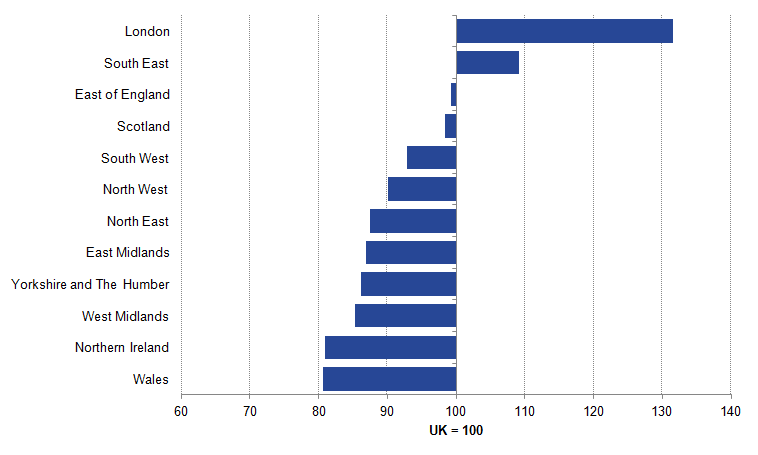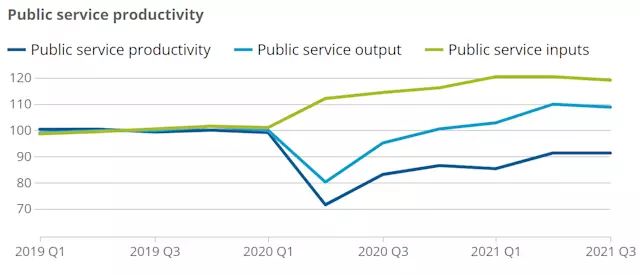Comments
- No comments found

Lack of leadership, weak management & business investment, supply chain issues, and too few commercial patents are the main factors behind the UK's weak productivity record.
Improving productivity in the UK is not a matter of getting people to work harder. It involves training, investment, innovation and finding smarter ways to do things. Above all we need to improve the quality of management and leadership across the board.
According to the Office for National Statistics (ONS) UK productivity has fallen to levels it held in 2007. Productivity in the UK has consistently lagged well behind Germany and France and has now been overtaken by many other countries. This is the key reason why wages, growth and competitive performance are all held back. Why is this and what can be done about it? Let's start with some likely causes:
British firms have been reluctant to invest in the capital equipment and processes necessary to improve productivity. Why invest large sums now when the future is so unclear - especially with all the uncertainty surrounding the Covid-19 pandemic and the war in Europe?
Why invest in an expensive strawberry picking machine when you get plenty of East European labourers to pick the fruit and pay them the minimum wage? Ironically we may need labour shortages and higher wages to provide incentives to find smarter and more productive ways to do things.
Much of the UK basic infrastructure is strained and overloaded. Look at the roads and railways. As traffic congestion increases care workers, salesmen and delivery drivers all take longer to make their journeys. They make fewer calls in a day - reducing their productivity.
Consider the desperate need for increased airport capacity in the south-east of England. While China builds more airports we cannot make a decision on where one extra runway should be placed. Weak political leadership, lobby groups, regulation and enquiries lead to a paralysis of decision making and action.

The regional variation in worker productivity in output per hour year-on-year growth 2019 - 2022 | Source: ONS
Low educational standards particularly in scientific and technical fields are holding back the economy. We have critical skill shortages in engineering, software, data analysis and IT. Who is going to design and program the robots?
Many organisations in the private and public sectors are operating in their comfort zones busily doing what they are doing. Managers and staff are often risk averse and reluctant to change. Look at the opposition to driver operated trains on Southern Rail. Most attempts to reform the NHS are met by a chorus of criticism but we need more experimentation and bold reforms if we are to find better ways to meet the needs of a growing and aging population.
Small firms in the UK are leaders in innovation but many large firms are sluggish. Local government has had to introduce many innovations in order to cope with cuts but central government, the NHS and major state bodies are just not innovating fast enough (or at all). Consider Parliament as a metaphor - it seems to revel in its archaic practices.

UK productivity keeps on falling during the Covid-19 pandemic| Source: Yahoo Finance
Total R&D expenditure represented 1.74% of gross domestic product (GDP) in 2019, putting it at the bottom of the G7 nations on this key indicator.
The UK ranked 18th out of 20 leading countries in a survey of employee engagement involving 7,000 respondents by research firm ORC International. Only 37 per cent of UK workers surveyed felt they were encouraged to be innovative and fewer than half felt valued at work, according to HR magazine. This reflects the next point.
If employees lack motivation, feel unvalued and lack engagement then it is the fault of managers. Poorly trained or incompetent managers are the major cause of employee dissatisfaction at work.
It is the job of the leaders at all levels to set the strategy and vision, to inspire and motivate their teams and to create a culture of progress and innovation. This plainly is not happening in many sectors.
Improving productivity in the UK is not a matter of getting people to work harder. It involves training, investment, innovation and finding smarter ways to do things. Above all we need to improve the quality of management and leadership across the board.
Paul is a professional keynote conference speaker and expert facilitator on innovation and lateral thinking. He helps companies improve idea generation and creative leadership. His workshops transform innovation leadership skills and generate great ideas for business issues. His recent clients include Airbus, Microsoft, Unilever, Nike, Novartis and Swarovski. He has published 30 books on lateral thinking puzzles, innovation, leadership and problem solving (with over 2 million copies sold). He also acts as link presenter at conferences and facilitator at high level meetings such as a corporate advisory board. He has acted as host or MC at Awards Dinners. Previously, he was CEO of Monactive, VP International of MathSoft and UK MD of Ashton-Tate. He recently launched a series of podcast interviews entitled Insights from Successful People.
Leave your comments
Post comment as a guest